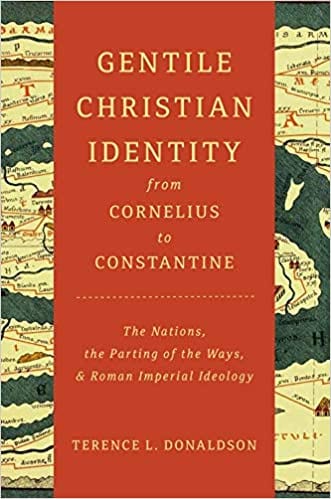Q. This book reflects an enormous amount of good research and reflection on both primary and secondary sources, though this subject has been treated in part by you in previous monographs. How long did it take you to put this detailed work together, especially considering the substantial discussion of the period beyond the NT era up to Constantine?
A. Thanks for the question, Ben, and for this opportunity to engage in some extended conversation about my book. While I have been working on this as my main research project since 2009 or so, my interest in these questions more generally goes back as far as my first year of theological education in the mid-1970s. In the early stages of a standard survey course on church history, I was suddenly struck by the fact that the major figures under discussion—Justin, Irenaeus, Tertullian, Origen, and so on—were all gentiles. How did it come about, I wondered, that a movement centered on a Jewish Messiah, a movement that consisted entirely of Jewish believers at the outset, had within a century become a largely gentile affair? In the process of working on a term paper, I read Justin’s Dialogue with Trypho and also happened to stumble across James Parkes’s The Conflict of the Church and the Synagogue, and thus encountered the adversus Judaeos tradition (the argument “against the Jews”), which added a troubling dimension to the question. So my interest in what has come to be called “the parting of the ways” and in the “gentilization” of the Christian movement goes back a long way.
As you have noted, I have dealt with various aspects of these questions in my previous work. In that work, though, I came at these questions mostly from the Jewish side, wondering how it was that the early Jewish disciples came so quickly to believe that the message of Jesus as Messiah was something for gentiles as well and how they made theological sense of it all (especially in work on Matthew and Paul). This led me to look at Jewish attitudes towards gentiles more generally, especially the ways in which Jews could conceive of gentiles as standing in a positive relationship with the God of Israel.
Returning to your question more directly, the impetus for this specific project occurred when I was reading Romans 11 for some purpose or other and my attention was caught by the way Paul addresses his readers (or at least some of them) in verse 13: “I am speaking to you gentiles.” Thinking about this from the perspective of non-Jewish listeners, I wondered what they would have made of the term. In Jewish usage, of course, the term ethnē (literally “nations”) was used to refer to non-Jews, outsiders, members of all other ethnic groups. People are generally not inclined to think of themselves in terms of some other group’s term for outsiders, and so it is unlikely that ethnē would have had any intrinsic appeal for non-Jews as an identity term. Non-Jewish Christ-believers, however, found themselves in a social world where “gentiles” (ethnē) was a basic category. Thus the question: What did they make of this ascribed identity?
Fortunately, at about this time I had a full-year sabbatical (most of which was spent at the University of Cambridge), which gave me the opportunity to explore the question in a sustained way. Here it readily became apparent that the question was significant. At the same time, I realized as the project began to take shape that to do it justice, I would need to involve myself in a number of areas where, despite some general familiarity, I could not claim any particular expertise—a list that eventually included ethnicity, social identity theory, post-colonialism, Greco-Roman ethnography, Roman imperial ideology and (to a lesser extent) ante-Nicene literature. This, together with some unexpected administrative responsibilities, meant that it became a ten-year project of research and writing.













